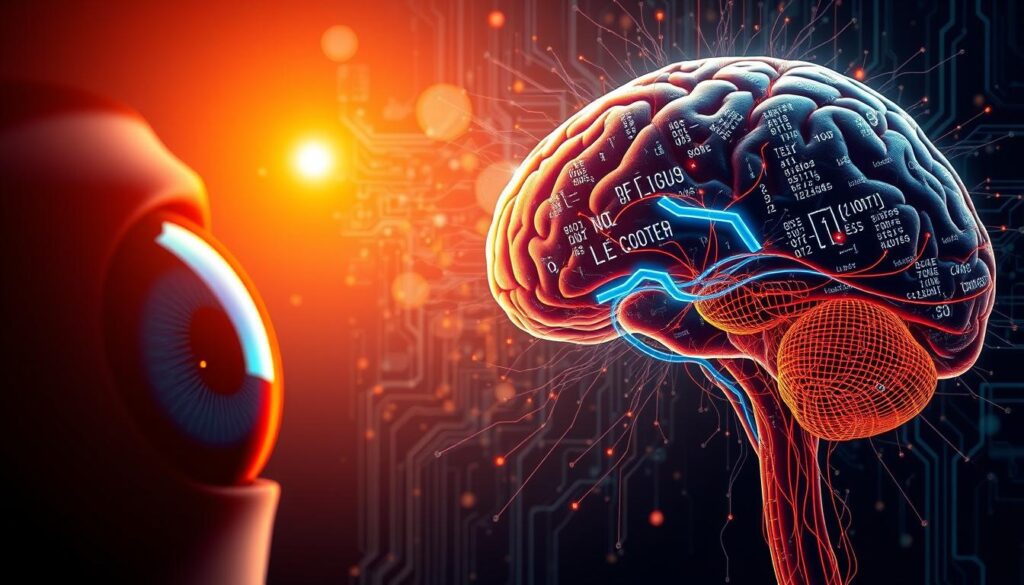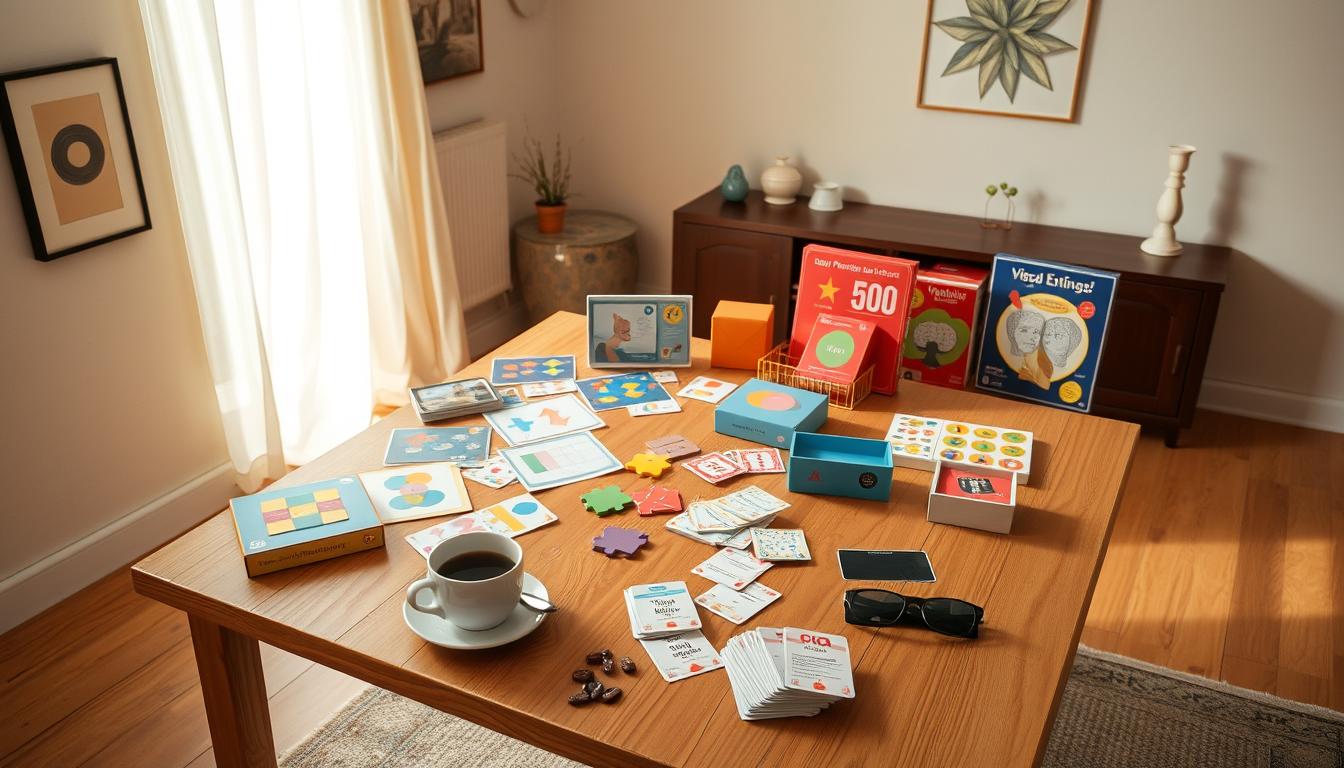Games that speed up word and image recognition in adults
Ever thought about how simple games could boost your brain’s speed in recognizing words and images? In today’s info-rich world, playing visual processing games could be your secret to quicker recognition. These games are not just fun; they also train your brain to process information better.
By adding these games to your daily life, you might start noticing patterns, words, and images more quickly and accurately. It’s a simple yet powerful way to enhance your cognitive abilities.
Understanding Visual Processing in Adults
Visual processing is how our brains make sense of what we see. It’s key for everyday tasks like reading, driving, and recognizing faces. Adults use their visual perception to sort out and understand the world around them.
Attention is crucial in visual processing. It helps us focus on what’s important, even when there’s a lot going on. For example, in a crowded café, we can listen to our friend while ignoring others. This shows how important visual processing is for doing things efficiently.
Here are some key points about visual processing:
- It’s the base for understanding complex scenes.
- It boosts problem-solving skills.
- Attention is key to ignoring what’s not important, helping us see what really matters.

Importance of Word and Image Recognition Skills
Word and image recognition skills are key for good communication and understanding. They help people quickly process and understand visual information. This makes learning and staying engaged in both personal and work settings easier.
Being good at recognizing words helps with reading smoothly. This is crucial for understanding complex texts. On the other hand, recognizing images helps us grasp the visual details of our daily lives.
Improving these skills boosts cognitive development. This means better focus and quicker thinking. It makes it easier to handle environments full of visual information, like schools and offices.
In short, focusing on word and image recognition can greatly improve learning and communication. It helps us understand different subjects better and communicate more effectively in various situations.

How Brain Training Enhances Cognitive Function
Regular brain training is key for adults to boost their brain power. It makes the brain work better by creating new paths for signals. This leads to better memory, focus, and solving problems.
Doing brain training over time makes a big difference. It makes the brain more flexible and strong. This helps the brain handle tough tasks with ease.
Brain training can be fun, like solving puzzles or playing games. These activities make the brain sharp and ready for everyday challenges. It’s a great way to stay mentally fit.
| Type of Activity | Benefits |
|---|---|
| Puzzles | Enhance critical thinking and pattern recognition. |
| Memory Games | Improve recall and retention of information. |
| Strategic Board Games | Strengthen planning and decision-making skills. |
| Crossword Puzzles | Boost vocabulary and linguistic skills. |
Benefits of Playing Visual Processing Games
Playing visual processing games has many benefits. It boosts mental agility and improves cognitive health. These games help players recognize things better and remember more. Studies show that playing brain games can slow down cognitive decline, keeping the mind sharp as we age.
Players often notice they can focus better and think more logically. This is because they need to quickly process and react to visual cues in the games. Brain games are like a mental exercise, strengthening brain connections and growing cognitive skills.
Adding visual processing games to your daily routine is fun and good for your mind. As you tackle harder games, you get the benefits of brain games. These benefits help keep your mind agile and healthy.
| Benefits | Description |
|---|---|
| Enhanced Memory | Regular gameplay strengthens memory through increased engagement with challenging tasks. |
| Reduced Cognitive Decline | Participating in these games may delay memory loss and cognitive deterioration. |
| Improved Attention Levels | Players develop the ability to focus better for longer periods of time. |
| Increased Logic Skills | Games often require strategic thinking, contributing to heightened logic and problem-solving abilities. |
Types of Games That Improve Recognition Skills
Many games help improve recognition skills by offering fun challenges. These games target different parts of the brain. They help us get better at recognizing things.
Word games like crosswords and word searches help with vocabulary. They make it easier to understand and remember words. This boosts our verbal skills.
Number puzzles, such as Sudoku, focus on math and patterns. Solving these puzzles sharpens our numerical skills. It also boosts our brain’s overall function.
Visual match games require quick identification of similarities and differences in pictures. They improve our visual perception and speed in processing visual information.
Knowing about different types of visual games helps us choose the right ones for brain training. Each game has its own benefits. This way, everyone can find games that match their cognitive goals.
Popular Visual Processing Games
Playing popular brain games can really help with word and image recognition. Sudoku, crosswords, and Scrabble are some of the most well-known games. Each game has its own way of challenging the mind and improving different skills.
Sudoku: A Mind Workout
Sudoku is great for sharpening your mind. It requires logical thinking and spotting patterns. Players fill a grid with numbers, following certain rules. This game boosts problem-solving and keeps your mind active.
Crosswords: Vocabulary Building
Crosswords are great for growing your vocabulary and memory. As you fill in the blanks, you dive into language and think deeply about words. It’s a fun way to exercise your long-term memory and improve your language skills.
Scrabble: Enhancing Linguistic Skills
Scrabble makes you think creatively with letter tiles. It’s all about forming words strategically to score points. Playing Scrabble can really improve your vocabulary and understanding of language.
Scientific Studies Supporting Brain Games
Many studies have shown that brain games can really help improve our thinking skills. These studies found that people get better at things like how fast they can process information and remember pictures. Playing these games regularly can make our brains sharper and healthier.
One study found that certain brain games can make our visual skills better. By training with these games, people showed big improvements in how well they could see and understand visual information. This proves that playing these games regularly can really make a difference in our brain power.
Other studies looked at how brain games help older adults. They found that playing these games regularly helps people remember things better and make decisions faster. This shows how important it is to make brain games a part of our daily routine if we want to keep our minds sharp.
| Study | Focus Area | Results |
|---|---|---|
| Smith et al. (2020) | Visual memory | Increased accuracy in memory tasks after 4 weeks |
| Johnson & Lee (2021) | Processing speed | Significant improvements in task completion time |
| Thompson (2019) | Problem-solving techniques | Enhanced critical thinking abilities following gameplay |
Engaging Brain Games for Daily Practice
Playing engaging brain games every day can really boost your brain power. There are many cognitive training apps out there that challenge your mind and sharpen your thinking. Apps like Lumosity and Peak offer fun games to improve memory, focus, and problem-solving skills.
These apps make learning fun and keep you coming back for more. They use interactive formats that make the experience enjoyable and motivating.
Apps for Cognitive Training
Cognitive training apps offer quick, effective games that fit into your busy schedule. You can play for a few minutes at a time, making it easy to fit into your day. The games are designed to be fun and engaging, helping you see your brain skills improve over time.
Classic Board Games vs. Digital Games
Both classic board games and digital games can help your brain. Board games like chess and Scrabble improve strategic thinking and social skills. Digital games, on the other hand, offer personalized challenges and track your progress.
Digital games give you instant feedback and show how you’re doing. This can be really motivating and helps you see how far you’ve come.
| Features | Board Games | Digital Games |
|---|---|---|
| Interactivity | Physical presence and social engagement | Personalized experience with solo play options |
| Adaptability | Limited adaptability; typically set rules | Customizable difficulty levels |
| Progress Tracking | No formal tracking | In-depth analytics and performance metrics |
| Accessibility | Requires physical components | Available on various devices |
Adjusting Difficulty Levels in Brain Games
Being able to change the game difficulty is key to getting the most out of brain games. Apps and games let players adjust their training to fit their needs. This makes it easier to see progress as challenges get harder.
As you get better at certain skills, you’ll feel a sense of achievement. This keeps you interested and motivated to keep playing.
Customizable Options for Skill Growth
Customizable training lets players grow at their own pace. You can pick what skills to work on, making it more personal and effective. This flexibility keeps you motivated and boosts your brain power, without feeling too stressed.
| Game Title | Difficulty Settings | Customizable Features |
|---|---|---|
| Lumosity | Beginner to Advanced | Focus areas, challenge frequency |
| Peak | Easy to Hard | Game variety, progress tracking |
| Elevate | Normal to Difficult | Personalized training, performance analysis |
Track Your Progress with Visual Games
Tracking progress in visual games helps players see how they’ve improved. Many games use game analytics to show how well players are doing. This shows how skills have grown, making it more fun.
Game analytics not only show what you’ve done well but also what you need to work on. It gives a clear view of how you’ve gotten better at recognizing things and processing information. Seeing your progress can motivate you to keep playing, helping you improve your brain skills over time.
| Game Type | Analytics Offered | Cognitive Improvements Noted |
|---|---|---|
| Sudoku | Time taken to solve, accuracy | Enhanced number recognition, logical reasoning |
| Crosswords | Word completion speed, difficulty levels | Vocabulary expansion, improved spelling |
| Memory Matching Games | Pairs matched, time per session | Memory recall, visual recognition |
Tips for Incorporating Games into Daily Life
Adding visual processing games to your daily routine can boost your brain. It’s fun and easy to do. Start by setting aside specific times for gaming. This makes it a regular part of your day.
Mobile apps are great for quick games during your commute or breaks. They help you practice often without getting in the way of work or school. Playing with friends or family makes gaming more enjoyable and helps you stay motivated.
Try different games to keep things interesting. Mixing it up can make brain training more effective. Setting small goals, like beating a level, can make you feel accomplished and keep you playing.
Benefits of Consistency in Playing Recognition Games
Playing visual processing games regularly offers many consistency benefits for your brain. By practicing often, you can get better at recognizing things. This makes your mind quicker and more agile, helping you make decisions and solve problems.
Sticking to a routine for brain games helps keep your mind sharp over time. It strengthens your brain’s connections, making it more flexible. This flexibility is key as you get older, helping you stay mentally sharp.
Research shows that regular mental exercises boost memory and speed up thinking. They also build up your brain’s reserve. This shows how important it is to make mental workouts a regular part of your life. It not only improves your skills but also makes your mind stronger and more capable.
The Role of Healthy Lifestyle in Brain Fitness
A healthy lifestyle is key to improving brain fitness. Regular exercise boosts memory and focus. It also increases blood flow to the brain, helping it grow and stay healthy.
Nutrition is also vital for brain health. Eating foods rich in antioxidants and healthy fats supports brain function. Foods like fatty fish, nuts, berries, and leafy greens can improve thinking skills and lower disease risk.
Social interactions are important too. Keeping in touch with friends and family reduces stress and boosts mental health. Adding brain games to social activities enhances cognitive abilities.
Combining exercise, good nutrition, and socializing creates a balanced lifestyle. This approach maximizes the benefits of brain training. It helps people reach their mental potential.
Conclusion
Visual processing games are great for improving word and image recognition. This article showed how playing these games can make our brains better. By playing regularly, we can get much better at seeing and understanding things.
It’s also key to live a healthy lifestyle while playing these games. Eating right, staying active, and keeping your mind sharp all help your brain. By adding these habits to your life, you can keep your brain in top shape.
Creating a routine that includes these games can make you smarter and more alert. It’s a fun way to improve your brain power. This can lead to a happier, healthier life.
FAQ
What are visual processing games?
Visual processing games are activities that help the brain better understand visual information. They work like physical exercises for the mind. They aim to boost skills in recognizing words and images.
How do visual processing games help adults?
Visual processing games can greatly improve cognitive skills in adults. They enhance visual attention, memory, and problem-solving. This leads to quicker and more accurate recognition of words and images in everyday life.
What cognitive skills are improved through these games?
These games improve skills like visual attention, memory, logical reasoning, and language. These skills are key for effective communication and understanding in both personal and professional settings.
Can brain games prevent cognitive decline?
Yes, playing brain games regularly can help prevent cognitive decline. They promote neural connections and boost mental agility. This helps keep cognitive functions sharp as we age.
What types of games are most effective for enhancing recognition skills?
Games like word puzzles (Scrabble), number puzzles (Sudoku), and visual match games are most effective. Each type targets specific cognitive goals, helping to develop skills in unique ways.
What are some popular visual processing games?
Popular games include Sudoku, Crosswords, and Scrabble. These games focus on different cognitive areas. They are essential for improving recognition skills.
Are there scientific studies supporting the benefits of brain games?
Yes, many studies show that brain games can significantly improve cognitive skills. They enhance processing speed and visual memory. This makes a strong case for playing these games daily.
How can I easily incorporate brain games into my daily life?
To make brain games a part of your daily routine, set aside specific times for playing. Use mobile apps for quick games during commutes. Include games in social activities. This keeps cognitive training consistent and fun.
What is the significance of tracking progress in brain games?
Tracking progress is crucial as it shows how cognitive skills improve. Many games offer analytics to track performance. This motivates continued practice and shows the benefits of brain training.
How does a healthy lifestyle contribute to cognitive enhancement?
A healthy lifestyle, including exercise, balanced nutrition, and social interactions, boosts brain games’ effectiveness. This holistic approach highlights the connection between mental and physical health for optimal brain function.














